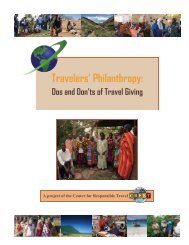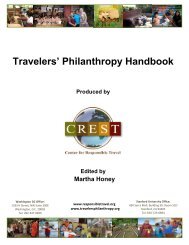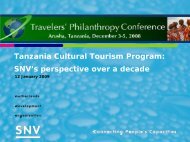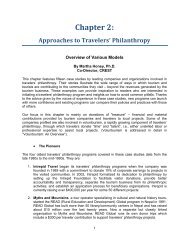Chapter 7: Conclusion - Center for Responsible Travel
Chapter 7: Conclusion - Center for Responsible Travel
Chapter 7: Conclusion - Center for Responsible Travel
You also want an ePaper? Increase the reach of your titles
YUMPU automatically turns print PDFs into web optimized ePapers that Google loves.
o Volunteers who work with children or other vulnerable populations must havebackground checks and be carefully monitored.o Environmental projects – tree planting, wildlife population surveys, beach cleanups, etc.—are often most suitable <strong>for</strong> outside volunteers.j. Programs need to be continually monitored, re-evaluated, and revised to ensure realneeds are being met <strong>for</strong> both the host community and volunteers. <strong>Travel</strong>ers: Steps to Successful <strong>Travel</strong>ers’ Philanthropy―Giving‖, writes Lars Lindkvist of the Basecamp Foundation, provides a deeper sense ofbelonging, both to people and to place and there<strong>for</strong>e travelers‘ philanthropy fulfills ―a basicneed.‖ However, giving can also have unintended negative consequences, especially when ittakes place across vast economic, cultural, geographic, and political divides.The following are some of the important considerations <strong>for</strong> travelers who seek to ―do good‖ bydonating ―time, talent or treasure‖:1. Ethical action = Good intentions + Good consequencesa. Good intentions can lead to unintended negative consequences.o As a visitor, you can be ill-in<strong>for</strong>med or naïve about the local community.o Gifts may unbalance the status quo, generate resentments, and be sabotaged.o Avoid impulse giving; contribute to community priorities.o Identify (with the assistance of a trustworthy tourism business) and work withlocal organizations that have an established track record and legitimacy. It helpsif the organization has been vetted by an outside NGO.o Recipients must take legal, financial, and psychological ownership of yourdonation.o Some donations should also include funds <strong>for</strong> maintenance.b. Donors should look <strong>for</strong> a project that meets the following checklist <strong>for</strong> ethical giving:o Project is needed and wanted by the local people.o Project‘s financial targets are clear and can be met through travelers‘contributions.o Project will appeal to future tourists.o An agreement is reached be<strong>for</strong>e starting the project as to who will finance andadminister maintenance and repair costs.o Funds are given to and administered by a locally acknowledged authority, whoreceives agreed upon compensation <strong>for</strong> this service.2. For Those Considering Bringing or Sending Material Goods or Suppliesa. Do not donate goods and supplies unless the organization specifically requeststhem. <strong>Travel</strong> companies should request that organizations they are supporting createa ―wish list‖ <strong>for</strong> travelers and volunteers to bring.b. Many material donations are of questionable or even negative value. They may notbe culturally appropriate or what is really needed, could be purchased locally, mayundermine local industries and retail businesses (clothing, book publishing), mayrequire costly or constant repairs or maintenance, and may incur import duties andother taxes, handling and transport costs.8















